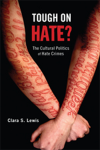Lewis, Clara S.; Tough on Hate? The Cultural Politics of Hate Crimes; 2014, Rutgers University Press, 152 p.

The author, a sociologist currently teaching critical and cultural criminology and hate crime studies at Stanford University, investigates in her book how violence and especially hate crimes are represented in a range of political, legislative, and cultural contexts and detect the narratives about perpetrators of hate crimes that cover the failing responsibility of the society as a whole for those incidences. Compelling and fascinating written, she is challenging the mainstream understanding of hate crimes and specifying contemporary bigotry which tries to relegate such crimes to individual criminal pathology. The debates about hate crimes are covered by national mythology which values such offences and actually intolerance as un-American. The nation turn out to be the real victim of hate crimes, a perspective that reveals the troubled relationship between national identity and expressions of bigotry. The effort to follow this fiction becomes apparent by emphasizing only sensationalized violence in media and publicity. The author indicates that the „extraordinary can hide the ordinary“ and shade social harm of the victims that is caused by lingering prejudice and false images against (racial, sexual, religious) minorities, perpetuated with the help of systemic, institutional and structural inequalities. Its appearance as subtle, complex and elusive often prevent its mainstream visibility. Hate crimes are both a category of criminal offense and a cultural construct, and the debate about the causes for hate crime alter over the time. Economic explanations as well as white supremacy or nationalist motivations rised within the framework of the debates concerning hate crimes, accompanied by a tremendous change in the climate of policy making, including criminal justice policy and the public news coverage. While in the American public the agents of the „poor white trash“ including stereotypes about class, mental health, masculinity and criminality got identified as the „natural“ figure of the hater, Lewis clarifies the reluctance of the society´s majority to consider bias-motivated offenses as a „pervasive social problem“. Instead, the personification of the perpetrator of hate crime and his or her singular culpability became a strategy in order to ethically elevate the nation above hate crimes. The exaggeration of the anti-hate-crime legislation in connection with the civil rights movement and the reinterpretation of each victim´s trauma as a patriotic act became part of the idiom of American exceptionalism: While America is defined as the „most successful multi-ethnic, multi-racial and multi-faith nation“ in the world´s history, existing hate crime got interpreted as „an unfortunate and offensive byproduct of a heightened consciousness of race, religion, gender and sexual orientation“ (Representative Hyde), committed by the few „imperfects“. By pointing out and prioritizing the harm to the nation as a whole, the real hate crime victims and minority communities get out of sight. Frighteningly, the „racial apathy“, means the „lack of feeling or indifference towards societal racial and ethnic inequality and lack of engagement with race-related social issues“ (Wachtel) contributes to persistence of racial stratification and the ongoing role of social institutions in reproducing social inequality. Probably, this author´s detection will not only be of relevance for race-related but also for gender- or sexual orientation-related dimensions. Lewis´ unmasks how mainstream understandings and denunciations of hate crime contribute to magnify its social harm instead of effectively facing it. It is a highly recommendable analysis of the cultural construct of bias-motivated offence and helpful for the deeper understanding of societal processes which focus on the social marginalization of minorities.
Rezensiert von: Katrin List